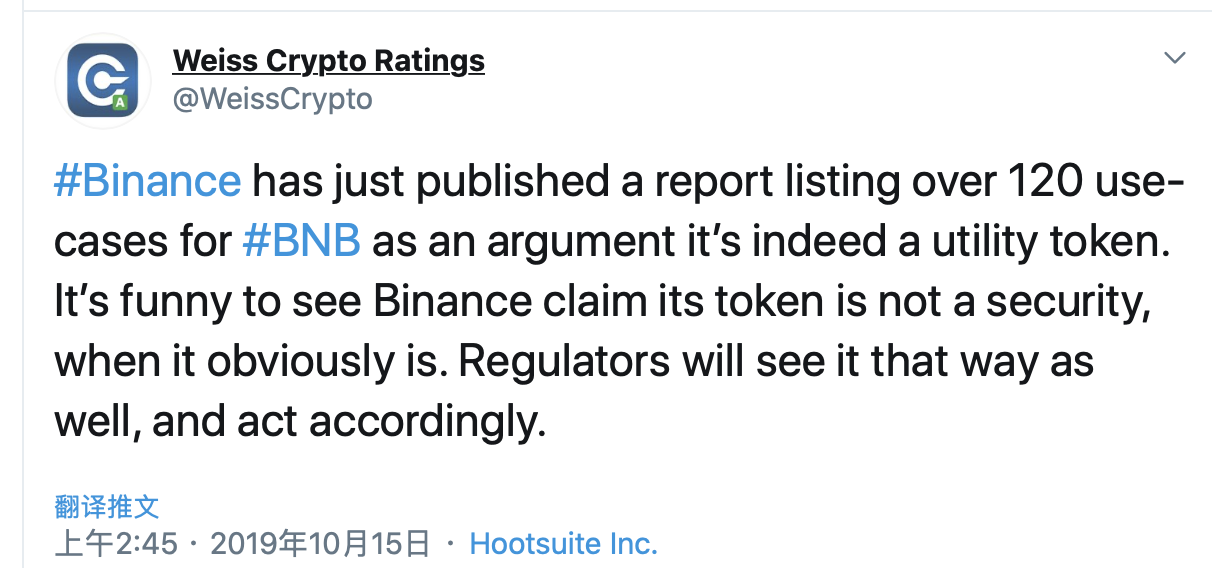Howe Test: SEC hangs the sword of Damocles on the head of the encryption company
The SEC once again started working on the relevant encryption companies, and this time the gun was aimed at Telegram. On October 11, the SEC announced that it had “emergency action and temporary restrictions” on the two offshore entities of Telegram’s TON 1CO. At this time, the TON main online line is less than 20 days.
The SEC relied on the TON network token to comply with the Howe test, and believed that its token, Gram, constitutes an investment contract and belongs to securities. Telegram is arrested for allegedly selling unregistered securities. The “Haowei Test” was once again moved to the front of the stage, securities, commodities or currency? stupidly can not tell.

What is the Howe test?
- CME Group Q3 Report: Bitcoin futures grew 61% year-on-year despite the market volatility
- Two times to prevent the ASIC from failing, Monroe will completely change the algorithm at the end of October.
- Members of the Libra Association are sure! But there is no Facebook on the list?
Howey Test is a regulation enacted in 1946 that currently determines whether cryptocurrencies should be regulated as a security. That is to say, as long as the conditions of the Howe test are met, the relevant assets issued by the company will be judged as securities.
The Howe test is an effective means of determining whether a financial instrument is an "investment contract" and then constitutes "securities". It contains four elements: (1) capital investment; (2) investment in a common cause; and (3) expectation of access. Profit; (4) not directly involved in the operation, rely solely on the efforts of the sponsor or a third party.
The SEC believes that the Gram issued by Telegram meets the above conditions, that is, it is determined that the issue and sale of the token is not registered in accordance with the Securities Law, so it is called urgently.
Repeated trials and trials, Howe test into a chasing blade
In 2017, with the rise of Ethereum, 1CO became a boom. Numerous encryption companies rely on them to finance themselves. Due to its complexity, the SEC has also taken steps to restrict this behavior.
First, the SEC requires 1CO to be registered as a security at the SEC.
Articles 5(a) and 5(c) of the US Federal Securities Act prohibit anyone from directly or indirectly using any means or tool in interstate commerce or mail to sell or issue securities, except in the SEC. Registration is in effect or eligible to be waived.
In the 1CO official website, the SEC also mentioned that "1CO can be issued in the form of securities, but subject to the federal securities laws of the US SEC."
Similarly, in order to maintain this regulation, the SEC sued the relevant illegal securities issuers on the grounds of violating securities laws.
In October 2018, the SEC sued Blockvest LLC and its three co-founders. The SEC alleged that Blockvest told 1CO investors that the company had filed a “registration” application with the SEC and had obtained “approval” from the SEC and other regulators. In fact, it was not registered with the SEC and was illegal. The token was eventually recognized by the court as illegal securities.
On September 30, US time, the US Securities and Exchange Commission announced a settlement with blockchain technology company Block.one (EOS parent company). The SEC has previously accused it of making an unregistered digital token (1CO) for the first time, raising billions of dollars in funding in about a year. Currently, the company agrees to settle these allegations by paying a $24 million civil penalty.
At the same time, blockchain company SimplyVital, 1CO issuer PlexCorps, etc. were all sued by the SEC for illegal securities issuance, but eventually settled with the SEC after paying a fine. In the controversy over this issue, the SEC has always had the upper hand.
However, there have also been companies that have struggled with the SEC to prove that their tokens are not securities.
Kik is a free app for instant messaging services, based in Canada. Its parent company has carried out 1CO in 2017, and the amount of financing by the original token kin has reached 98 million US dollars. He was also accused of illegal securities issuance by the SEC.
In order to fight against the SEC, the Kin Foundation even launched the Defend Crypto fund, striving to fight the SEC until the company was forced into bankruptcy and asked for a new Howey Test on the cryptocurrency for the encryption field. Better regulation.
But continued entanglement with the SEC has caused the company to pay more than 5 million Canadian dollars. It is also announced that the company Kik announced that it will close the application and lay off 19 people, and the price of the currency is close to zero.
What should TON do? Reconciliation is still fighting ?
Telegram said in a letter to investors that it does not agree with the SEC lawsuit and is assessing whether it is necessary to postpone the release of TON.
Unlike the SEC's after-the-fact supervision of EOS, the Telegram main network will be stopped by the SEC before it goes online. Whether it is reconciliation or resistance, it will cost more than EOS.
According to CNBC host Ran Neuner, Telegram investors have been informed and asked for advice on whether to accept the TON token Gram extension for one year. If there are no more than half of the private equity investors who agree to postpone the extension, then TON will need to refund the money on October 31. At the same time Telegram is trying to reconcile with the SEC.
According to statistics, if Telegram can reconcile, Telegram needs to pay the SEC $10.2 million. At the same time, it means that the token must be legally registered as a securities, and can only be traded at a compliant exchange regulated by the SEC, but this will also greatly limit the development of TON.
If you insist on going online, the project will surely entangle with the SEC, and it will harm the interests of many parties from any angle.
The fundamental point of the dispute is whether Gram is a security, that is to say whether it meets the "Hoowei test."
The new version of "Haowei test" is imminent
The SEC has become more and more strict in compliance measures, but it has also exposed the huge flaws of the old law in the face of new things, which are vague and difficult to define.
Take Kin, because it involves 1CO financing, which also includes an ecosystem token that is not functional at the beginning of the release, which is a challenge for Howell's testing. But for Kik, the point is not whether to pass the Howe test, but to prove that Howe test is not the right way.
For example, in the “expected profit” in the Howe test, the SEC could not produce direct evidence that the investor’s intention to purchase was driven by profit, which caused the complexity of the case.
The encryption company Circle has said: "We have been calling for the clarity of regulation to promote the development of encryption technology in the United States. Fortunately, in this fight, we are not alone. Circle and Poloniex support and appreciate Kin The Foundation's efforts to protect encryption technology. We are at a critical moment in the industry, the United States has the risk of being left behind, and entrepreneurs should not be forced to innovate elsewhere. Legislators should stop applying the laws enacted in the 20th century. The technology created in the 21st century."
Bill Hinman, head of corporate finance at the SEC, said that the key factor in determining whether a token is a security is the degree of decentralization of the project. SEC Chairman Jay Clayton also confirmed that in US law, ETH and other similar cryptocurrencies are not securities.
However, in reality, the number of projects that can reach the degree of decentralization of Bitcoin and Ethereum is still rare, and the standard of identification is still ambiguous. The SEC chairman also mentioned that the cryptocurrency is not stocks and bonds, so the cryptocurrency Naturally, it cannot be governed by the provisions of the Securities Law.
Weis Crypto Ratings, a rating agency for Weiss Ratings, said: "Coin has recently published a report listing more than 120 BNB use cases to prove that BNB is indeed a practical generation. Utility token. This is very interesting. Coin said that its token is not a kind of securities, but obviously it is. The regulator will see it this way and take corresponding action."
And this may also cause the platform currency to fall into the "Do not think, but want me to think" point, the consequences of being targeted by the regulatory authorities is what everyone can imagine.

So before the introduction of clear cryptocurrency regulations, the "Hooway Test" is still the sword of Damocles hanging high on all encryption companies.
It can't solve the problem, but it is fatal!
We will continue to update Blocking; if you have any questions or suggestions, please contact us!
Was this article helpful?
93 out of 132 found this helpful
Related articles
- Libra's five board members were freshly released, and a16z said that its initial intentions have not changed.
- QKL123 Quote Analysis | Bitstamp is now a large transfer, is a managed transfer BitGo? (1015)
- Observation | The total amount of USDT in Ethereum is close to the Bitcoin network, and the revenue of Bitcoin miners exceeds US$15 billion.
- The blockchain national team is here! National Information Center and UnionPay jointly released blockchain service network
- Science | Compound cToken and related core functions
- Research Report | Cryptographic Liquidity Analysis: BTC, ETH and Stabilizing Coins are the most liquid assets
- Suspected fraud or trading volume is zero? Inventory the reasons why the year's encryption project disappeared





